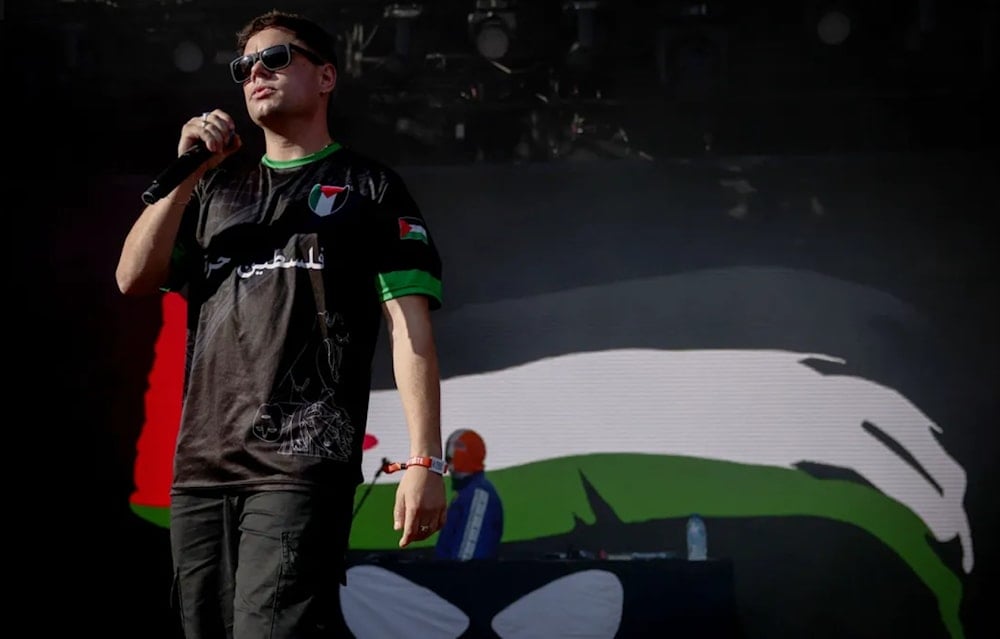Gaza genocide sparks divisions in global music industry: WSJ
The war on Gaza has ignited deep divisions in the global music industry, with artists facing boycotts, backlash, and pressure to take sides on "Israel" and Palestine.
-

One of the members of the band Kneecap, during their concert at Rock en Seine, on August 24, 2025. (AFP)
The Wall Street Journal highlighted on Saturday how the war in Gaza, now nearing its second year, has ignited unprecedented activism across the music industry. From global pop stars to underground acts, more musicians are using their platforms to call out "Israel's" onslaught and show solidarity with Palestinians, while those who remain silent face mounting criticism from fans and campaigners.
The Boycott, Divestment and Sanctions (BDS) movement has stepped up its campaign, urging boycotts of performers and promoters linked to "Israel." Its latest call targeted Radiohead's European tour, citing the band's Tel Aviv show in 2017 and guitarist Jonny Greenwood's collaborations with an Israeli artist.
Music Meets Politics
On stage, visible support for Palestine has become impossible to ignore. Imagine Dragons, after insisting for months that they would not take sides, eventually raised a Palestinian flag in Milan. Charli XCX joined the movement at Primavera Sound Porto, leading chants of "Free Palestine" after online pressure from her fans.
Glastonbury Festival became a flashpoint this summer, as English rap duo Bob Vylan declared "Free, free Palestine" before shouting "Death, death to the IDF." The intervention provoked condemnation from Prime Minister Keir Starmer and the Israeli embassy, yet for many in the crowd, it reflected raw anger at "Israel’s" attacks on Gaza. The group has since been dropped by its agency, a move activists say proves how the industry punishes artists for standing with Palestine.
The pressure is not only on those speaking out over the genocide, but also on artists who have taken sides with the Israeli occupation. Azealia Banks, a staunch supporter of Zionism, claimed UK festivals were trying to coerce her into pro-Palestinian statements, while Israeli-Iranian singer Liraz Charhi said she lost concerts after refusing to post "Free Palestine." Meanwhile, two joint shows by Greenwood and Israeli musician Dudu Tassa were canceled earlier this year following BDS pressure.
Artists face backlash
Radiohead's Thom Yorke attempted a nuanced response, condemning "Israel's" government as "extremist and cynical" while also calling Hamas "equally cynical." He argued that chanting "Free Palestine" avoided addressing Hamas's role in the October 7 events. BDS dismissed Yorke's comments as having "whitewashed genocide." Yorke admitted the backlash had taken "a heavy toll," adding: "Social media witch-hunts (nothing new) on either side pressurizing artists and whoever they feel like that week to make statements etc do very little except heighten tension, fear and oversimplification of what are complex problems."
U2 also criticized both "Israel" and Hamas in August but were attacked in Ireland for not going further against "Israel." Irish singer Mary Coughlan called their remarks "putrid and pathetic." Others, however, praised the band's tone as a rare moment of balance.
Coldplay frontman Chris Martin, during a London concert, tried to calm tensions when two Israeli fans were met with boos and cheers. "I'm very grateful that you're here as humans. We are treating you as equal humans on Earth, regardless of where you come from," he said.
Read more: Kneecap stands strong amid Coachella backlash over Palestine
With the global live music industry worth nearly $35 billion last year and set to nearly double by 2035, promoters worry that a groundswell of pro-Palestine activism will force the industry to rethink its ties to "Israel." For campaigners, however, this is precisely the point: to ensure that the business of entertainment cannot remain neutral in the face of "Israel’s" genocide in Gaza.

 4 Min Read
4 Min Read








